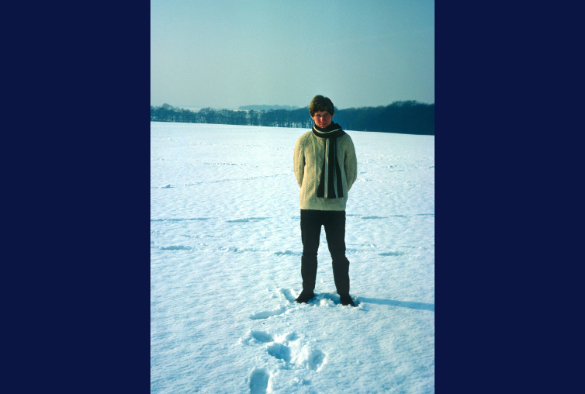
Welcome to the latest instalment of ‘Donor Spotlight’. In this ongoing series, we highlight the significant impact made by our alumni and friends, whose support and generosity towards our Student Fund creates endless possibilities for students to make the most of their time in Liverpool. In this instalment, we speak to Professor J. Brian Boyd MD FRCS FRCSC FACS (MB ChB 1972, MD 1980) who reflects on his time at Liverpool, his successful career and what inspired him to support Liverpool students.
Tell us about your experience of studying at the University of Liverpool.
My first winter was in digs at Arrowe Park on the Wirral, then the largest civic park in the country (possibly still so). It was the great white winter of 67/68 and the whole park was blanketed in a foot of snow (Pictured above). It looked majestic but felt bitterly cold, and I recall buying an army surplus great coat to wear first on the bus, then on the train to Central station, before a freezing walk up a wind-swept Brownlow Hill to the Department of Anatomy. I remember seeing abandoned cars near Paddy’s Wigwam (Liverpool Metropolitan Cathedral).
Later, we had a snowball fight with the engineers and some of our year even smuggled snowballs into the organic chemistry lecture to hurl at the luckless lecturer.
Oddly, I got a distinction in that subject. I knew very little organic chemistry, but in the rudimentary multiple-choice exam, one question asked how many isomers there were of a certain molecule: 2, 4, 6 or 8. If you moved the atoms around, it appeared that there were 8 possibilities for the 3-dimensional molecular structure. However, on close inspection, all you had to do was pick up number 2, turn it upside down and it was the same as number 8. The answer was therefore 7, not an option on the test! I crossed it out and wrote an explanation in the margin (they were hand-marked back then). The other questions I answered indifferently, but the examiner clearly saw my potential!
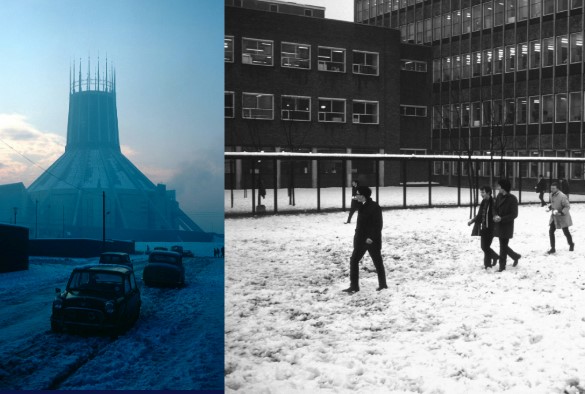
Liverpool in the winter of 1967/68
What did you do after graduating?
Between graduation (1972) and my departure in 1978, I was successively a house officer (Broadgreen); a demonstrator in anatomy; a surgical registrar (Sefton, Birkenhead General and Whiston) and finally a senior research fellow at Alder Hey Children’s Hospital.
At Liverpool, I saw patients with TB, syphilis, syringomyelia, Ricketts, malaria, leprosy, arsenic poisoning, and a host of ‘rare’ diseases that students at other UK schools could only read about. This was in addition to a vast array of the common pathologies in all fields of clinical practice. As a student, I delivered 30 babies, pulled a dozen teeth, and sutured a hundred wounds.
Our chair of Medicine was Sir Cyril Clarke. Sir Robert Shields headed up Surgery; and the irascible Sir Norman Jeffcoate was professor of OB-GYN. What other medical school had or has three knights of the realm simultaneously in the three major clinical specialties?
Above all, the legendary Liverpool wit and tolerance shown by our teachers, colleagues, and, indeed, patients made the experience of learning not only one of life’s joys but a great preparation for any career where human interaction is paramount.
When did you move to the US, and have you been back to the University since you graduated?
I moved to Canada in 1978 to complete a residency program in plastic surgery at the University of Toronto (1978-82). (By that time, I already had my FRCS in general surgery.) Then, following a fellowship in microsurgery in Melbourne (1982-1983), I took up a consultant position at the Toronto General Hospital. I was recruited to the Cleveland Clinic Florida (Ft. Lauderdale) in 1994 where I remained until my move to UCLA in 2005. I plan to retire next year.
I have attended every 10-year reunion of my graduating class except 1982, during my fellowship in Australia. This includes the 50th year reunion in 2022. Several of us now keep in touch every few months with a Zoom meeting and online with WhatsApp. I have returned to Liverpool for the reunions, to show my younger daughter (now a corporate law partner in New York) the home of the Beatles, and for the annual BAPS meeting when it was held there in 1986 under the presidency of Mr. D. O. Maisels FRCS(E), my mentor in plastic surgery.
David Maisels retired from Whiston Hospital in the late 1980’s and moved to Edinburgh where I visited him shortly before his death in 2023. He was 97. We often joked that his retirement was longer than my career! By coincidence, his son, Duncan lives in Fernie, BC where we regularly go to ski. I see him often.
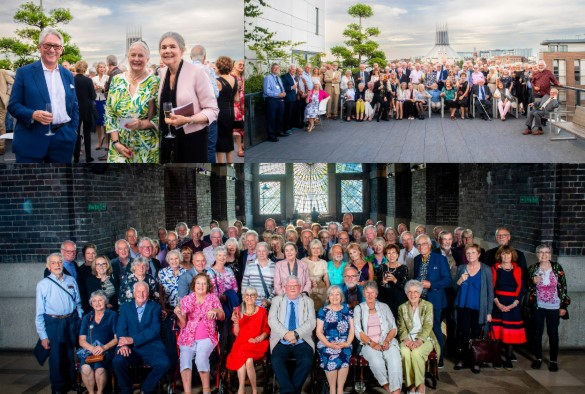
University of Liverpool Reunions
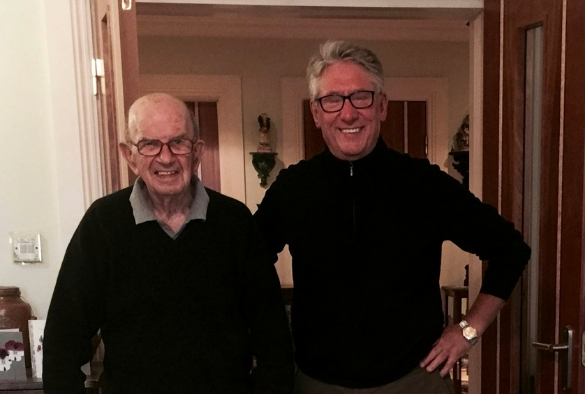
David Maisels and Brian in 2023
Thank you for supporting the University for the past 17 years. What first inspired you to start supporting the University?
The alumni system in the US is very well developed, particularly in fundraising. I run into professional fundraisers from time to time who are employed by various departments within the university in raising money for academic enrichment, bricks and mortar projects and research into the treatment of specific diseases. The university itself has a host of full-time staff doing the same thing. I felt I should support my alma mater just as my colleagues do theirs, particularly since it gave me the education, the early life experiences, and the contacts on which my subsequent career was based.
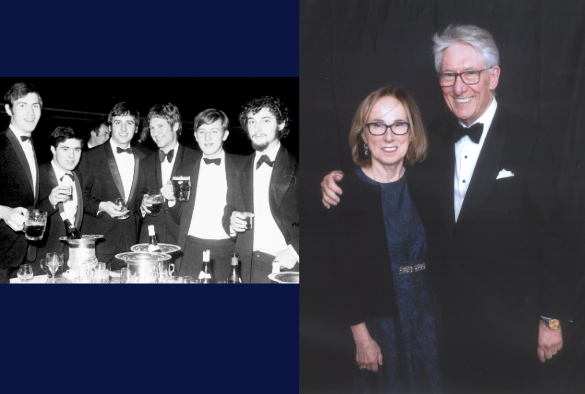
The Medical Dinner, 1968 (Left) and Brian and his wife Jeanette Derdemezi, Chair of Anaesthesiology at Harbor-UCLA. They met at Broadgreen Hospital on the first day of their house jobs. (Right)
On behalf of the University community, we’d like to thank Brian for sharing his Liverpool memories and for his ongoing support of Liverpool students. If you would like to share your story, please contact us: giving@liverpool.ac.uk.